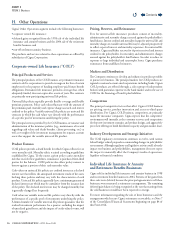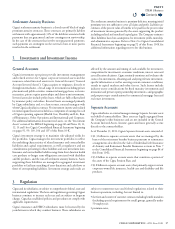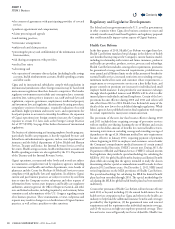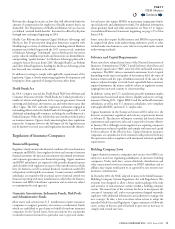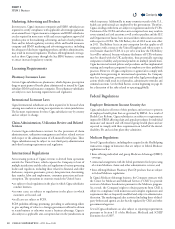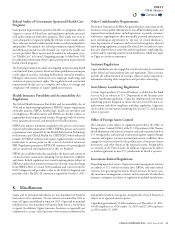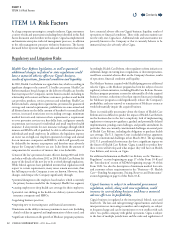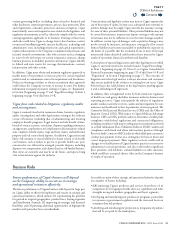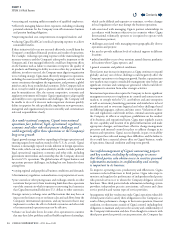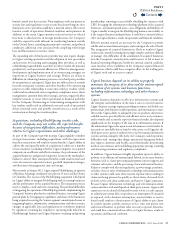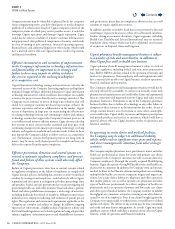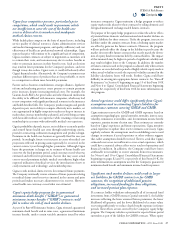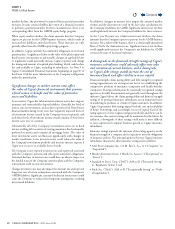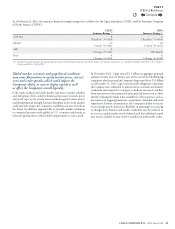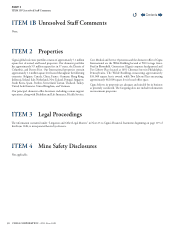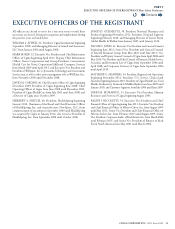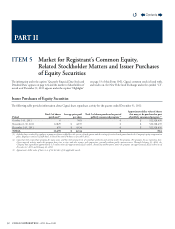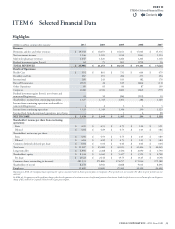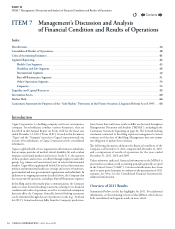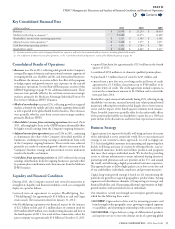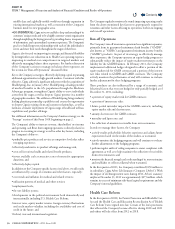Cigna 2011 Annual Report Download - page 48
Download and view the complete annual report
Please find page 48 of the 2011 Cigna annual report below. You can navigate through the pages in the report by either clicking on the pages listed below, or by using the keyword search tool below to find specific information within the annual report.
26 CIGNA CORPORATION2011 Form10K
PARTI
ITEM 1A Risk Factors
Computer systems may be vulnerable to physical break-ins, computer
viruses, programming errors, attacks by third parties or similar disruptive
problems. If a cybersecurity breach of Cigna’s computer systems or the
computer systems of a third-party service provider occurs, it could also
interrupt Cigna’s operations and damage Cigna’s reputation. Cigna
could also be subject to liability if sensitive customer information is
misappropriated. Any publicized compromise of security could result
in a loss of existing or new customers, increased operating expenses,
nancial losses, and additional litigation or other claims, which could
have a material adverse eect on Cigna’s business, results of operations
and nancial condition.
Effective investment in and execution of improvements
in the Company’s information technology infrastructure
and functionality are important to its strategy and
failure to do so may impede its ability to deliver
the services required in the evolving marketplace
at a competitive cost.
Cigna’s information technology strategy and execution are critical to the
continued success of the Company. Increasing regulatory and legislative
mandated changes will place additional demands on Cigna’s information
technology infrastructure, which could have direct impact on available
resources for projects more directly tied to strategic initiatives. e
Company must continue to invest in long-term solutions that will
enable it to anticipate customer needs and expectations, enhance the
customer experience and act as a dierentiator in the market. Cigna’s
success is dependent, in large part, on maintaining the eectiveness
of existing technology systems and continuing to deliver and enhance
technology systems that support the Company’s business processes in
a cost-ecient and resource-ecient manner. Cigna also must develop
new systems to meet current market standards and keep pace with
continuing changes in information processing technology, evolving
industry and regulatory standards and customer needs. Failure to do so
may impede the Company’s ability to deliver services at a competitive
cost. Furthermore, system development projects are long-term in
nature, may be more costly than expected to complete and may not
deliver the expected benets upon completion.
Effective prevention, detection and control systems are
critical to maintain regulatory compliance and prevent
fraud and failure of these systems could adversely affect
the Company.
Failure of Cigna’s prevention, detection or control systems related
to regulatory compliance or the failure of employees to comply with
Cigna’s internal policies, including data systems security or unethical
conduct by managers and employees, could adversely aect Cigna’s
reputation and also expose it to litigation and other proceedings, nes
and penalties. Federal and state governments have made investigating and
prosecuting health care and other insurance fraud and abuse a priority.
Fraud and abuse prohibitions encompass a wide range of activities,
including kickbacks for referral of members, billing for unnecessary
medical services, improper marketing, and violations of patient privacy
rights. e regulations and contractual requirements applicable to the
Company are complex and subject to change. In addition, ongoing
vigorous law enforcement, a highly technical regulatory scheme and
the Dodd-Frank legislation and related regulations being adopted that
enhance regulators’ enforcement powers and whistleblower incentives
and protections, mean that its compliance eorts in this area will
continue to require signicant resources.
In addition, provider or member fraud that is not prevented or detected
could impact Cigna’s medical costs or those of its self-insured customers.
Further, during an economic downturn, Cigna’s segments, including
Health Care, Disability and Life and International, may see increased
fraudulent claims volume which may lead to additional costs because
of an increase in disputed claims and litigation.
Cigna’s pharmacy benefit management business is subject
to a number of risks and uncertainties, in addition to
those Cigna faces with its health care business.
Cigna’s pharmacy benet management business is subject to federal
and state regulation, including federal and state anti-remuneration
laws, ERISA, HIPAA and laws related to the operation of Internet and
mail-service pharmacies. Noncompliance with such regulations could
have a material adverse eect on Cigna’s business, results of operations,
nancial condition and reputation.
e Company’s pharmacy benet management business would also be
adversely aected by an inability to contract on favorable terms with
pharmaceutical manufacturers and could suer claims and reputational
harm in connection with purported errors by Cigna’s mail order or retail
pharmacy businesses. Disruptions at any of the Company’s pharmacy
business facilities due to failure of technology or any other failure or
disruption to these systems or to the infrastructure due to re, electrical
outage, natural disaster, acts of terrorism or some other catastrophic
event could reduce Cigna’s ability to process and dispense prescriptions
and provide products and services to customers, which could have a
material adverse eect on Cigna’s business, results of operations and
nancial condition.
In operating its onsite clinics and medical facilities,
the Company may be subject to additional liability,
which could result in significant time spent and expense
and divert management’s attention from other strategic
activities.
e Company employs physicians, nurse practitioners, nurses and other
health care professionals at onsite low acuity and primary care clinics
it operates for the Company’s customers (as well as certain clinics for
Company employees). rough the recently acquired HealthSpring
business, Cigna also operates LivingWell health centers and health care
practices for its customers. In addition, the Company owns and operates
medical facilities in the Phoenix, Arizona metropolitan area, including
multispecialty health care centers, outpatient surgery and urgent care
centers, low acuity clinics, laboratory, pharmacy and other operations
that employ primary care as well as specialty care physicians and other
types of health care professionals. As a direct employer of health care
professionals and as an operator of primary and low-acuity care clinics
and other types of medical facilities, the Company is subject to liability
for negligent acts, omissions, or injuries occurring at one of its clinics or
caused by one of its employees. Even if any claims brought against the
Company were unsuccessful or without merit, it would have to defend
against such claims. e defense of any actions may be time-consuming
and costly, and may distract management. As a result, Cigna may incur
signicant expenses which could have a material adverse eect on Cigna’s
business, results of operations and nancial condition.
Contents
Q


